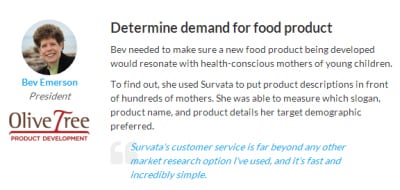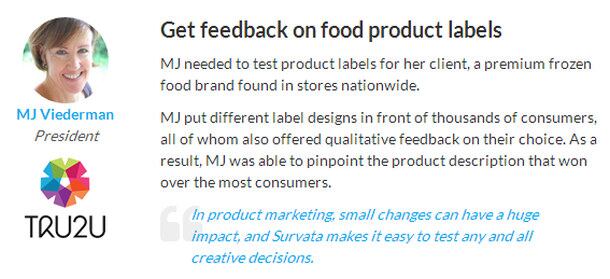And as most SMEs can't afford to shell out tens of thousands of dollars on the latter, a good number of them have historically launched their wares on an unsuspecting public with almost no reliable feedback from the consumer groups they are actually targeting.
Today, however, if you want validation from consumers other than your best friend and the guy sitting next to you at work, but don't have a five-figure budget for research, there are a lot more options, Chris Kelly, co-founder and CEO of consumer survey specialist Survata told FoodNavigator-USA.
Thanks to firms such as Survata and rival Instant.ly (click HERE), CPG companies of all sizes - from entrepreneurial start-ups to multi-nationals - can now get rapid and affordable insights at every stage of the product development process that can help them develop better products, and deliver more data-driven pitches to potential customers (or the boss), said Kelly.
Avoiding ‘survey addicts’
San Francisco-based Survata - which was founded in 2012 and works with a growing number of clients in the food & beverage sector - enables marketers to develop short surveys to determine demand for new products, get feedback on label or other changes, test which ad slogans resonate best with target consumers … and anything else.
While it does sometimes use online consumer panels developed by market research groups, Survata’s primary audience comprises readers of websites where paid-for content (eg. news stories behind a firewall, e-books, videos etc) is ‘unlocked’ for free if they agree to take a short survey.
Respondents, therefore, are not ‘survey-addicts’ or potentially biased sets of consumers that already like your brands because you are incentivizing them with your products - but “people that are not usually reached by market researchers”, claimed Kelly.
Marketers can use their first survey question for screening purposes
But how do Survata’s clients know who is taking their surveys and if they are the kind of consumers it wants to target?

First, survey respondents must provide basic information including their gender, age and location, said Kelly. “Then marketers can use their first survey question for screening purposes [in order to drill down to the groups they wish to target].
“So for example, your screening question might be, ‘How many cups of coffee do you typically drink per day?” (Answers: 0 cups, 1 cup, 2 cups, 3+ cups etc). If you are targeting heavy coffee drinkers, you can then screen out everyone that ticked 0-1 cup a day, he said.
It’s democratizing consumer insights
Clients come up with their own survey questions, get rapid feedback on the wording from a Survata analyst, make changes if appropriate, and then submit their edited surveys to Survata, which posts them with its online publisher partners. The surveys have a maximum of six questions - which are open-ended or multiple choice - and can include pictures and multi-media.
Each respondent costs $1 (1,500 people = $1,500) and users can expect feedback within days, rather than weeks, as is often the case with more traditional research models, said Kelly.
For large firms, insights gleaned from Survata surveys can then be supplemented with research from focus groups, telephone surveys or online panel surveys, he said.
Many of our clients have never done paid-for surveys before
Because the pricing is accessible, some clients are now using Survata surveys to ‘sense-check’ what they are doing at every stage of the product development process - creating multiple surveys over a period of weeks and months, he added (click HERE for some examples).
“It’s democratizing consumer insights. Many of our clients have never done paid-for surveys before.
"I remember when I was sitting on the other side of the fence [in a previous job] being quoted $30,000 for a survey by an agency, and for many small companies, that’s just not affordable. It can also mean weeks of bureaucratic hell."
Click HERE for more details.

